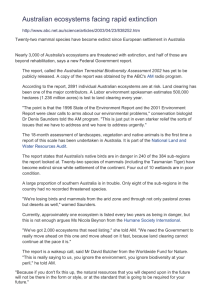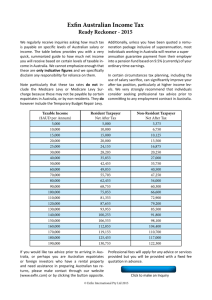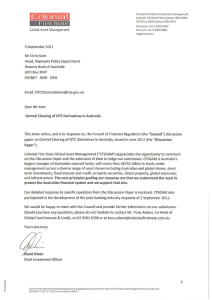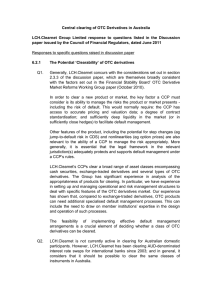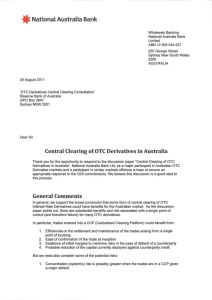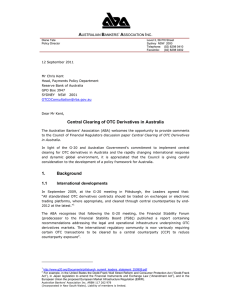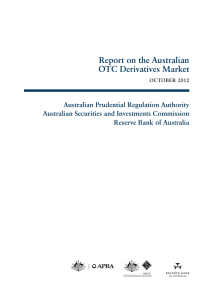D ut he Ban OTC Derivatives Central Clearing Consultation
advertisement
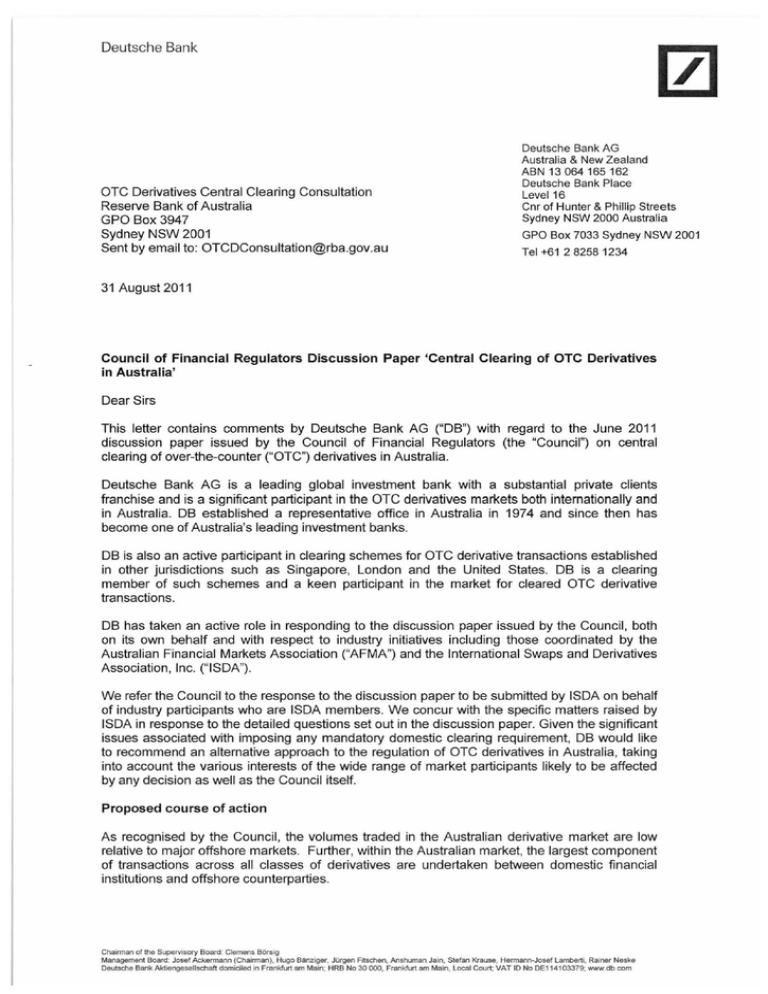
Deutsche Ban k OTC Derivatives Central Clearing Consultation Reserve Bank of Australia GPO Box 3947 Sydney NSW 2001 Sent by email to: OTCDConsultation@rba.gov.au Deutsche Bank AG Australia & New Zealand ABN 13 064 165 162 Deutsche Bank Place Level 16 Cnr of Hunter & Phillip Streets Sydney NSW 2000 Australia GPO Box 7033 Sydney NSW 2001 Tel +61 2 8258 1234 31 August 2011 Council of Financial Regulators Discussion Paper 'Central Clearing of OTC Derivatives in Australia' Dear Sirs This letter contains comments by Deutsche Bank AG ("DB") with regard to the June 2011 discussion paper issued by the Council of Financial Regulators (the "Council") on central clearing of over-the-counter ("OTC") derivatives in Australia. Deutsche Bank AG is a leading global investment bank with a substantial private clients franchise and is a significant participant in the OTC derivatives markets both internationally and in Australia. DB established a representative office in Australia in 1974 and since then has become one of Australia's leading investment banks. DB is also an active participant in clearing schemes for OTC derivative transactions established in other jurisdictions such as Singapore, London and the United States. DB is a clearing member of such schemes and a keen participant in the market for cleared OTC derivative transactions. DB has taken an active role in responding to the discussion paper issued by the Council, both on its own behalf and with respect to industry initiatives including those coordinated by the Australian Financial Markets Association ("AFMA") and the International Swaps and Derivatives Association, Inc. ("ISDA"). We refer the Council to the response to the discussion paper to be submitted by ISDA on behalf of industry participants who are ISDA members. We concur with the specific matters raised by ISDA in response to the detailed questions set out in the discussion paper. Given the significant issues associated with imposing any mandatory domestic clearing requirement, DB would like to recommend an alternative approach to the regulation of OTC derivatives in Australia , taking into account the various interests of the wide range of market participants likely to be affected by any decision as well as the Council itself. Proposed course of action As recognised by the Council , the volumes traded in the Australian derivative market are low relative to major offshore markets. Further, within the Australian market, the largest component of transactions across all classes of derivatives are undertaken between domestic financial institutions and offshore counterparties. Chal(l'nan of the Supervisory Board Clemens BOrstg Management Board: Josef Ackermann (Chairman). Hugo Banziger, JOrgen Fttsdlen, Anshuman Jain, Stefan Krause, Hermann-Josef Larnbertt, Ratner Neske Deutsche Bank Akttengesellschaft domiciled In Frankfurt am Main; HRB No 30 000, Frankfurt am Matn, Local Court; VAT 10 No DE114103379, www.db com IZI DB believes that premature action taken by the Council in mandating the establishment or use of a central clearing counterparty ("CCP") in relation to OTC derivative products in Australia or by Australian market participants would cause significant damage to the OTC derivative market in Australia, as well as introduce rather than reduce systemic risk and depriving Australian market participants of access to a single open and liquid market in interest rate and currency risk. By imposing a mandatory clearing requirement on domestic entities and participants in the domestic Australian market, the Council would effectively create a two-tier market by driving up operational costs domestically whilst being unable to control offshore business. Further, pools of liquidity offshore may be closed to domestic entities who are mandated to use a local central clearing counterparty. DB proposes that the Council instead focus on the reporting of OTC derivative transactions, through agreement with other regulators via the OTC Derivatives Regulators' Forum ("ODRF"). DB believes that the Council will have more success in understanding and managing the Australian OTC market through effective trade reporting in the first instance, as opposed to establishing a domestic CCP allowing a view only of the domestic Australian activity of any clearing member rather than a complete view of any given counterparty or market exposure. This approach offers significant benefits: (1) The current national approach to regulation bears the risk of creation of regional trade reporting repositories ("TRR") and CCPs that would force the Council to consolidate information from multiple CCPs, TRRs and sources domestically and overseas in order to understand the systemic risk to the entities and markets they regulate. Working with the ODRF and participating actively in the establishment of a global TRR would mitigate against this; (2) The use of a single global TRR to cover reporting of each asset class would give the Council visibility over the post-trade processing infrastructure for both cleared and noncleared transactions whether entered into domestically or overseas and by Australian market participants or over Australian underlying securities; (3) By not establishing a domestic CCP at this stage, the Council would ensure that it does not promote a two-tier market in Australian underlying OTC derivatives, negatively impacting domestic Australian market participants in terms of limiting their access to global pools of liquidity available to other participants outside of Australia and driving up local operational costs. DB is grateful for the opportunity to comment on the discussion document and looks forward to contributing further to the discussion in whatever capacity is required. Please do not hesitate to contact me should you have any questions. Yours faithfully, ~ - Head of Global Markets Rates Australia
